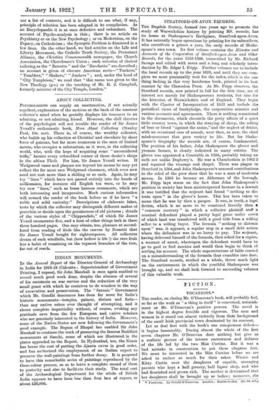STRATFORD-ON-AVON RECORDS.
THE Dngdale Society, formed two years ago to promote the study of Warwickshire history by printing MS. records, has its home at Shakespeare's Birthplace, Stratford-upon-Avon. It has naturally begun operations by printing for its subscribers; who contribute a guinea a year., the early records of. Shake- speare's own town. Its first volume contains the Minutes and Accounts of the Corporation of Stratford.upon-Avon and Other Records, for the years /553-1566, transcribed by Mr. Richard Savage and edited with notes and a long and scholarly intro. duction by Mr. Edgar I. Fripp. Further volumes are to include the local records up to the year 1620, and until they are com- plete we must presumably wait for the index, which is the one thing lacking in this very handsome book, printed in its best manner 4, the Clarendon Press. As Mr. Fripp observes, the Stratford records, now printed in full for the first time, are of interest not merely for Shakespearean students; but also for the historian of Warwickshire and of England. They begin with the Charter of Incorporation of 1653 and include the periodical views of frankpledge, the corporation minutes and various accounts and agreements. There is nothing sensational in the documents, which chronicle the petty affairs of a quiet little country town, in which the straying of sheep, the selling of beer or bread "against the assize," and the neglect of drains, with an occasional case of assault, were then, as now, the chief misdemeanours that gave variety to life. But for Shake- speare's biography the records are, of course, fundamental. The position of his father, John Shakespeare the glover and yeoman farmer, is clearly indicated in many entries. The glover was appointed a Constable. in 1558„ probably taking an oath not unlike Dogberry's. He was a Chamberlain in 1562-3 and repaired the vicarage and chapel. There was plague in Stratford in 1564, and John Shakespeare's assessed contributions to the relief of the poor show that he was a man of moderate means. In 1565 he became an Alderman of the borough, Mr. Fripp lays stress on the fact that John Shakespeare's position in society has been misinterpreted because in a lawsuit it was testified that the serjeant had found " nothing to dig- train upon " in the glover's house. This has been taken to mean that he was by then a pauper. It was, in truth, a. legal fiction, which is no more to be construed literally than * " common recovery " in which a collusive plaintiff ant a nominal defendant played a pretty legal game under covet of which land was transferred with a good title from a willing seller- to a willing buyer. The formula " nothing to distrain upon " was, it appears, a regular step in a small debt action where the defendant was in no hurry to pay. The serjeant, having delivered himself of the formula, then asked for a capias, a warrant of arrest, whereupon the defendant would have to go to gaol or find sureties and would then begin to think of settling his account. The whole superstructure of fable erected on a misunderstanding of the formula thus crumbles into dust. The Stratford records, studied as a, whole, throw much light on the environment in which the youthful Shakespeare was brought up, and we shall look forward to succeeding volumes of this valuable work.


































 Previous page
Previous page